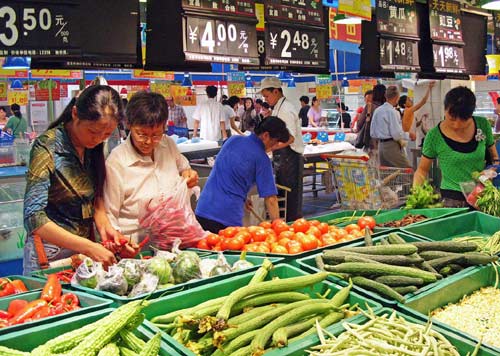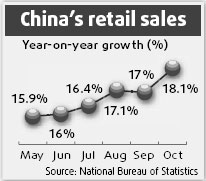October retail up by 18% from '06
Updated: 2007-11-15 06:51
 |
|
Shoppers buy vegetables at a supermarket in Yichang, Hubei Province. China's retail sales rose 18.1 percent year-on-year in October due to rising prices and incomes. [China Daily] |
The growth was 1.1 percentage points higher than in September, according to the National Bureau of Statistics, and analysts said the steady trend will continue.
"Sales benefited from record-high consumer price index (CPI) and income," said Shen Minggao, chief economist with the Citigroup in Beijing, in a research note.
"This could represent a trend in consumer confidence and resilient consumption down the road to the year of the Olympics," he said.
In the first 10 months, retail sales registered a year-on-year growth of 16.1 percent to reach 7.2 trillion yuan ($969.17 billion). It was 0.2 percentage point higher than the 15.9 percent growth achieved in the January-September period.

People spent about 45 percent more in October compared with a year ago on grain, edible oil, meat and poultry.
In the first nine months, retail sales of grain and edible oil increased by 37 percent year-on-year, while meat and poultry spending increased by 40.5 percent.
Rising inflation is a factor contributing to the spending spree in October, analysts agreed. The CPI resurged to the decade high of 6.5 percent in October after it eased a bit in September from the peak in August.
Food prices increased by 17.6 percent year-on-year in October, with prices of fresh vegetables rising sharply and meat and poultry prices remaining strong.
Clothing sales were up 32.6 percent in October, automobiles 36.1 percent, building materials 42.5 percent and daily necessities 27.5 percent.
Rising income has similarly boosted expanding retail sales. Disposable income of urban residents rose 13.2 percent from a year earlier in real terms in the first nine months, while net income of farmers increased by a real 14.8 percent.
The so-called "holiday effect" also contributed to the spending boom.
People generally spend more during the week-long National Day holiday starting October 1. The surging stock and property markets at that time rendered them more money for spending.
"The momentum is good and sound, and is expected to continue," said Shi Jianhuai, economist with Peking University's School of Economics.
(China Daily 11/15/2007 page14)
|
|